Ever since Myanmar won freedom in 1948, political instability and ethnic tensions prompted the military to emerge as the kingmaker in national politics as it consolidated the monopoly over violence in the country. Only fourteen years after independence, Myanmar’s civilian regime was ousted by General Ne Win in 1962. After twelve years of Martial Law, the country got its second constitution in 1974 and subsequently a hybrid regime was installed. The arrangement continued till 1988, when pro-democracy protests spread across the country (popularly known as the 8888 uprising), demanding the end of military rule. The brutal repression resulted in a coup under General Maung under the umbrella of State Law and Order Restoration Council. Despite the crackdown, the protests gave birth to the National League for Democracy (NLD), which would take over two decades to take charge of the Myanmar government in 2015.
While the limited democracy ceded by the military brought the NLD to power, the former’s legislative veto curtailed the civilians from taking independent decisions. Su Kyi’s troubled relationship with the army was reflected in the elected government’s inability to control violence in the Rakhine state which resulted in the exodus of a large number of Rohingyas into Bangladesh. The international community had interpreted the government’s lukewarm approach as a potential complicity in the crisis.
In 2020, the NLD won with a greater majority and ironically, the military accused the party of electoral fraud, ultimately deposing Suu Kyi and her government.
Since the coup d’état on February 1, 2021, Myanmar’s journey has not been easy.The Committee Representing Pyidaungsu Hluttaw (CRPH), consisting of democratically elected lawmakers (ousted by the junta) formed a parallel government as they refused to accept the military dictatorship. On its part, the military tried engaging with different ethnic groups in order to legitimize its control over the upcoming elections. Further, if reports are to be believed, the Nationwide Ceasefire Agreement signed between the military and various ethnic groups in 2015 stands null and void.
The junta also reduced Suu Kyi’s sentence, which does not seem to evoke much confidence in the international community either. In the last week of July 2023, the military extended the emergency for the fourth time. This is a violation of the 2008 constitution, which only permits two consecutive extensions. The junta leadership defended its action as a measure to curb terrorism. Naturally, the coup has caused widespread protests across the country, to the extent that the civilians organized themselves into armed groups and the military resorted to air attacks. The US State Department estimates that over 1.6 million civilians have been displaced in this conflict. To prevent its acts from international scrutiny, the junta imposed internet restrictions and curfews across the territory it administers.
The international response to the coup was mixed. While many countries imposed sanctions on the junta and supported pro-democracy efforts, others maintained direct commercial relationships with the military. The United Nations and regional organizations like the Association of Southeast Asian Nations (ASEAN) have attempted to mediate, but progress remains sluggish. Under Indonesia’s Chairmanship, the ASEAN initiated a dialogue between the civilian and military stakeholders but China’s influential role and the junta’s diplomatic channels with some ASEAN nations have remained large distractions on the road towards a political solution. Similarly, the US sent a strong signal through the passing of Burma Act, but we are yet to see its effectiveness.
As the coup’s anniversary approached in 2022, Myanmar’s situation remained dire. The economy struggled, and basic services were disrupted. Humanitarian organizations highlighted the worsening humanitarian crisis, with reports of displaced people and food shortages.
The success of Myanmar’s transition solely lies in the military’s willingness to cede power to the civilian institutions and allow free and fair elections. In conclusion, Myanmar’s journey since 2021 has been marked by significant challenges and moments of bleak hope. The coup in a way also highlights the resilience of Myanmar’s pro-democracy forces. However, the success of democracy ultimately depends on the commitment of all parties involved to uphold democratic principles and ensure a peaceful and inclusive transition. The present state of affairs appears unsustainable and sooner or later, the forces of popular will have to be brought forward.

